Our live coverage is movingpublished at 04:03 BST 22 April 2022
For technical reasons we are moving our live coverage.
Please join us at this webpage for all the latest.
US President Joe Biden announces an additional $800m security assistance package for Ukraine
Biden says the aid, including heavy artillery weapons, ammunition and tactical drones, will be sent "directly to the frontlines of freedom"
Ukrainian President Volodymyr Zelensky says Russia has rejected a proposal for a ceasefire this weekend - Moscow has not commented
Vladimir Putin orders his troops not to storm the Azovstal steel plant, where the last group of Ukrainian fighters in Mariupol is holding out
Instead, the president tells them to seal it up so even a "fly" cannot escape, and says Russia has control of the strategic port city
Some civilians trapped for weeks in the wider south-eastern city have been able to leave, but far fewer than hoped
Edited by Yvette Tan
For technical reasons we are moving our live coverage.
Please join us at this webpage for all the latest.
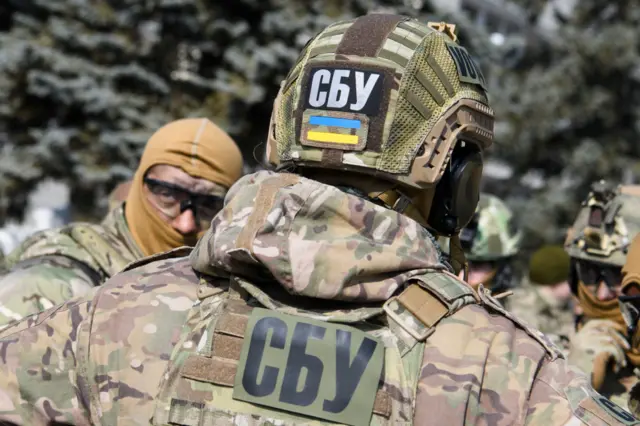 Image source, Getty Images
Image source, Getty ImagesRussian state media reports that Russian forces have seized identifying information on all of Ukraine's special security services (SBU) personnel in the Kherson region.
According to the Ria Novosti news agency, a cache of documents abandoned by SBU employees fleeing the region fell into the hands of Russian troops.
The recovered documents contained names and photos, some of which were published in full by the outlet.
Ria Novosti also alleges that the SBU includes special forces trained in sabotage and reconnaissance, and working for the government.
The BBC has not independently verified these claims.
Toby Luckhurst
Reporting from Lviv
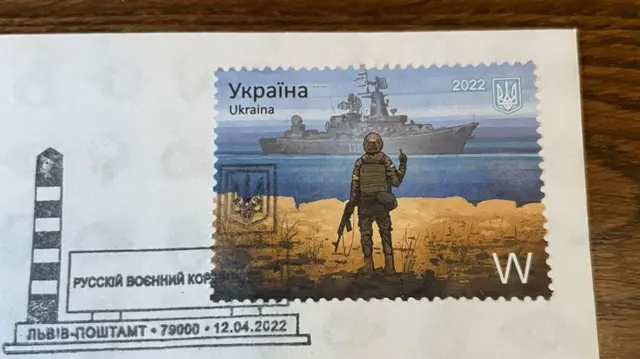
It was a moment of defiance that summed up the spirit of a nation – when defenders of a small Ukrainian island, ordered to surrender by the Russian warship Moskva, told the vessel to go away (in more colourful language than we can report here).
Ukraine has now immortalised the moment with limited edition commemorative postal stamps. They’ve quickly become the must-have collectible across the country.
Julia Aurora Ogorodnyk is a food writer in Lviv. She was in her car when she heard on the radio that the first ones had been released. She went to the post office first thing the next morning, and just in time - only four were left.
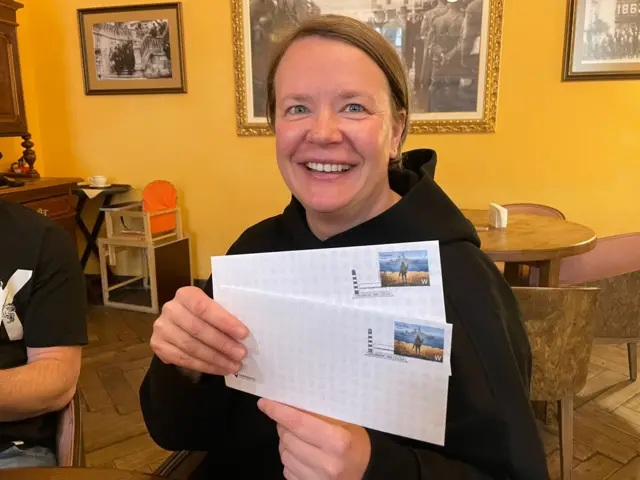
Julia shows off the stamps
Knowing how popular they were proving, she had them stamped with the date, making them more valuable by showing they were part of the first batch released. “It’s more unique,” she said.
That same day, reports emerged that the Moskva had sunk. “So now it’s even more valuable!” she says.
She doesn’t plan to sell them, at least not yet – she’ll save them for herself, and might put them on display at home.
“It’s a symbol of how a small person can resist huge forces – and make them regret it!”
You can read more here about the Moskva warship and its encounter with the Snake Island soldiers.
The Russians have left but the suburbs of Kyiv are still dangerous.
Officers are working to clear towns of mines and shells left behind by Russian forces.
And increasing numbers of people are checking into hospital after making contact with the unexploded munitions.
Ukrainians injured or killed by unexploded ammunition
The letter "Z" has become a staunchly pro-war symbol of Russia's invasion of Ukraine, sported by politicians, athletes and others.
BBC Russian reports that anti-war rock band DDT were set to perform at an auditorium in the central city of Tyumen, only to find "a huge letter Z" had been drawn inside the hall.
The group's lead singer Yuri Shevchuk - who has spoken out against the war and Vladimir Putin several times - told a local journalist the group had refused to play at the site.
He added that DDT had picked another site, without the letter Z, but had not been allowed to perform there either.
Read more: Why has 'Z' become a Russian pro-war symbol?
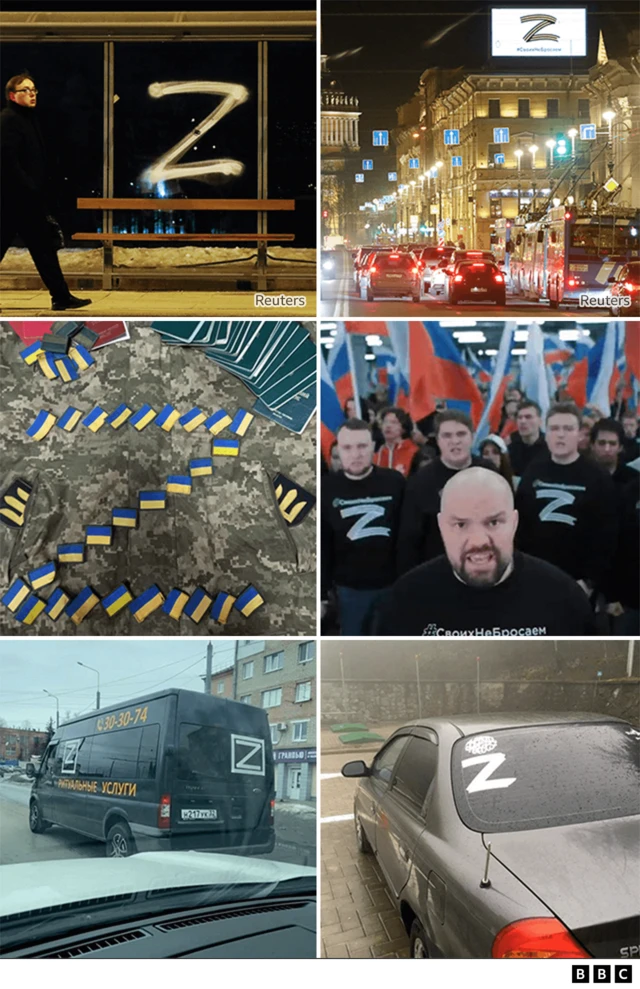
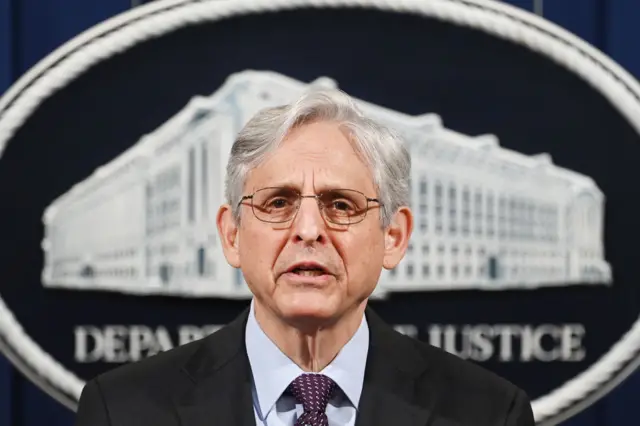 Image source, Getty Images
Image source, Getty ImagesUS Attorney General Merrick Garland has said American prosecutors are looking into evidence of potential war crimes by Russian forces in Ukraine.
At a news conference on Thursday, he said the US had been "in contact with the Prosecutor General of Ukraine", along with other international allies assisting in the effort.
"We are helping in the collection of evidence and the preservation of evidence relating to possible war crimes," said Garland.
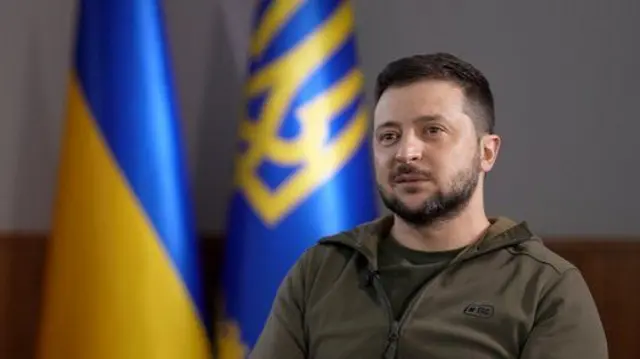
Ukrainian President Volodymyr Zelensky says Russia has rejected a proposal for a ceasefire during Orthodox Easter, taking place on Sunday 24 April.
Senior members of the clergy across the globe have been pressing the Russian Orthodox Church to condemn the Kremlin's invasion of Ukraine.
The Russian Orthodox Church has not commented on the issue.
In a video address, Zelensky said despite the rejected truce, he still harbours hopes for peace. The Kremlin has not confirmed the Ukrainian leader's claim.
 Image source, Getty Images
Image source, Getty ImagesIf you're just joining us, here are the latest developments on the war in Ukraine:

Ukrainian Deputy Prime Minister Iryna Vereshchuk apologised to residents of Mariupol for failed evacuation efforts from the besieged port city.
In a Telegram post, external, she said "everything is very complicated, chaotic, slow and, of course, dishonest" from the Russian side.
Ukrainian authorities have been trying to evacuate people from Mariupol throughout the conflict, and humanitarian efforts were often called off due to a lack of Russian cooperation, according to Ukraine.
Vereshchuk said shelling near one of the evacuation collection points in the city forced Ukraine to close the humanitarian corridor to Zaporizhzhia.
She added: "we will not give up trying to get you out of there! Hold on!".
As we've been reporting, Ukraine hoped to evacuate 6,000 people on Wednesday but around 80 were able to make it to Ukraine-controlled Zaporizhzhia.
Ukrainian officials estimate that 100,000 people are currently trapped in Mariupol.
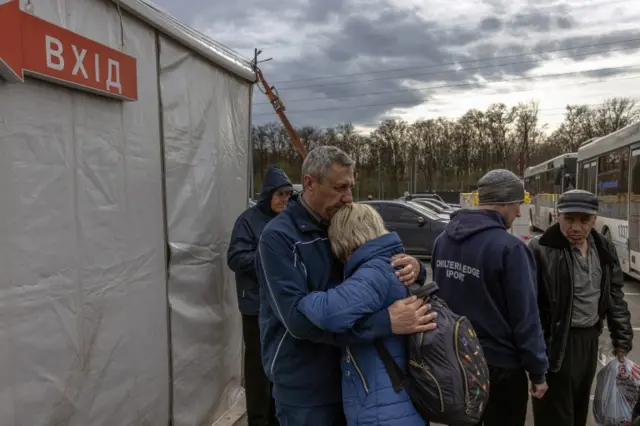 Image source, EPA
Image source, EPASome of the Mariupol residents arriving in Zaporizhzhia on Thursday
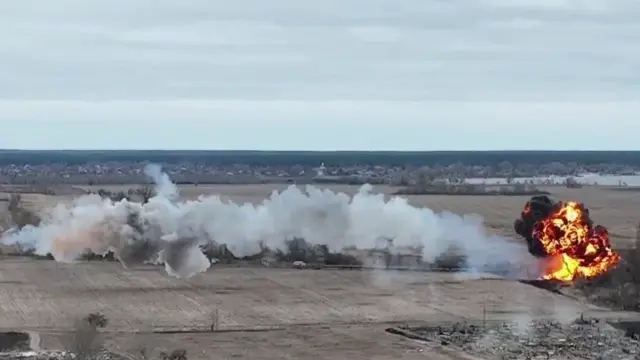 Image source, Getty Images
Image source, Getty ImagesUkrainian Ministry of Defence image of a Russian helicopter being shot down in early March
The latest $800m (£612.5m) package for Ukraine includes "dozens" of howitzers - a type of artillery that fires shells at targets on high trajectories - as well as 144,000 rounds of ammunition and tactical drones to be used on the flat plains in eastern Ukraine.
Other armaments sent so far include Switchblade drones that can be turned into flying bombs and anti-aircraft weapons that can shoot helicopters from the sky.
In total, more than $3bn in military aid has been sent to Ukraine since Russia invaded on 24 February.
"Sometimes we will speak softly and carry a large Javelin, because we're sending a lot of those in as well," Mr Biden said this week of US aid to Ukraine, in reference to the anti-tank weapon.
Additionally, the Pentagon said on Thursday that it is giving Ukraine "ghost drones" - similar in capabilities to the Switchblade "kamikaze drones". A Pentagon official sid the weapons were "rapidly developed by the Air Force in response specifically to Ukrainian requirements".
The range and specific capabilities of the "ghost drones", however, are not publicly known.
The US has so far been reluctant to send Ukraine US-made tanks, arguing that Ukrainian troops aren't familiar with the vehicles.
Similarly, while the US has so far committed to sending Ukraine 16 Mi-17 helicopters, it has not directly sent aircraft to Ukraine and has described a plan to send Soviet-made Mig-29 jets from other countries - such as Poland - to Ukraine as untenable.
Read more:
What weapons has the US given Ukraine - and how much do they help?
Russian forces have occupied 42 villages in the eastern Donetsk region today, an aide to President Volodymyr Zelensky's chief of staff has told national television.
But the aide, Olena Symonenko. said Ukrainian forces might "win them back tomorrow".
Russia is continuing its offensive in the Donbas, made up of Donetsk and Luhansk, attempting to expand its control within in the eastern regions.
A US defence think tank said that Russian forces had made minor gains yesterday, taking parts of the key frontline towns of Rubizhne and Popasna.
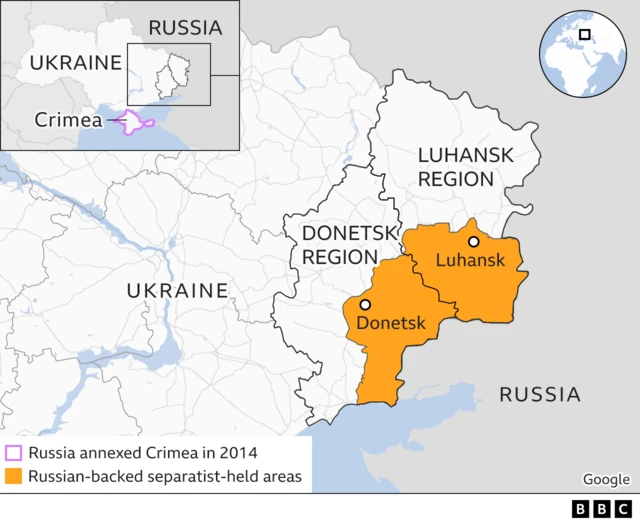
Ukraine's prosecutor general, Iryna Venediktova, has told the BBC about the scale and the types of the crimes she and her team have been investigating since the Russian invasion began.
She said there were some places they still could not visit because it was not safe, but that they have seen huge numbers of civilian deaths and evidence of torture and sexual crimes.
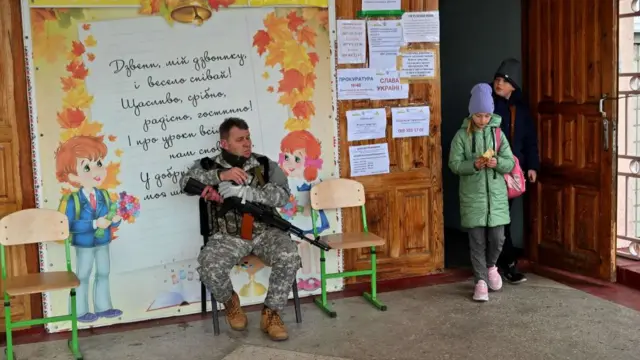 Image source, Getty Images
Image source, Getty ImagesA Ukrainian soldier guards a school in Borodyanka
Addressing a forum of the World Bank and IMF remotely, Ukrainian President Volodymyr Zelensky has accused Russia of threatening global food supplies with its invasion of Ukraine.
Russia's blockade of Ukrainian Black Sea port cities has made it impossible for the country to export food supplies such as wheat, he said.
Russia's war in Ukraine has seen food prices skyrocket in places that rely on grain exports from the country, such as Northern Africa.
Zelensky added that Ukraine now needs approximately $7bn (£5.4bn) per month due to severe "economic losses" caused by the war. This is an increase from the $5bn Kyiv previously said was needed each month.
He added that the "Russian military are aimed at destroying all objects in Ukraine that can serve as an economic base for life. That includes railroad stations, food warehouses, [and] oil refineries."
So what does Putin's decision in Mariupol mean for the other theatres of conflict in Ukraine if the Donbas were to fall?
It all depends on how the fight in the Donbas goes over the next two or three weeks, military expert Justin Crump says.
"That's why this period is so critical - based on that, you will either see a peace, a pause in conflict, or just a protracted ongoing war, and that depends on both sides of course," he says.
Ultimately it will depend how well the Russians do against the Ukrainians there, he adds; it will define whether Putin settles for what he's got at that point, whether the Russians feel they've destroyed the heart of the Ukrainian military and showed Nato supplies aren't enough to hold them off - they can keep coming and take cities like Kharkiv.
They still have 22 battlegroups north of Kyiv in Belarus, Crump says; they're being held there for a reason, Russia is keeping its options open for the rest of the country - but that could be very difficult if it loses a lot of forces in the Donbas, he adds.
"Mass burials of Mariupol residents killed by the Russian army" are taking place in a village nearby, the city council of the southern Ukrainian port says.
In a statement, it says "the occupiers are digging trenches about 30-metre (98ft) long and using dump lorries to bring the bodies" to a site on the outskirts of the Manhush village, just to the west of the besieged city on the Sea of Azov coast.
The Mariupol city council has posted an aerial photo purportedly showing the site, saying it "is already twice as large as the nearby cemetery".
"Almost 80 years ago, the Nazis shot dead 12,000 Mariupol residents in the village of Agrobaza. It is near Manhush. Not more than 13 km. History repeats itself again. Only instead of German fascists Russians have come," the statement says.
The BBC has not independently verified the claim, and Russia has so far made no public comments on the issue.
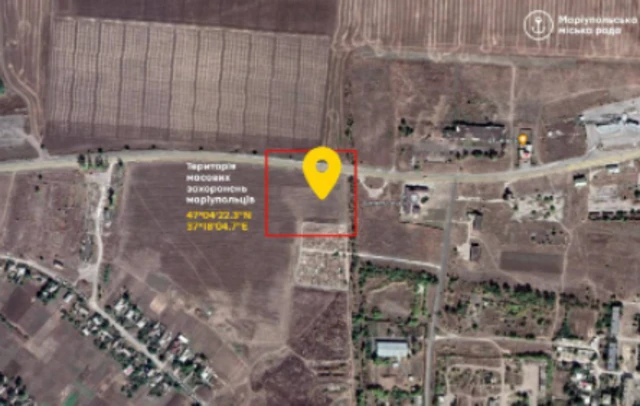 Image source, Mariupol city council
Image source, Mariupol city councilA photo by Mariupol's city council allegedly showing the site of mass grave (red square) near the city
However, US technology company Maxar says that its recent high-resolution satellite imagery "reveals the existence of a mass grave site on the north-western edge of Manhush, Ukraine (located approximately 20 km west of Mariupol) and adjacent to an existing village cemetery".
"A review of our satellite images from mid-March through mid-April indicate that the expansion of the new set of graves began between 23-26 March, 2022, and has continued to expand over the past couple of weeks.
"The graves are aligned in four sections of linear rows (measuring approximately 85 metres per section) and contain more than 200 new graves," Maxar says.
The American company has also posted a series of satellite images purportedly showing the expansion of a mass grave site near Mariupol.
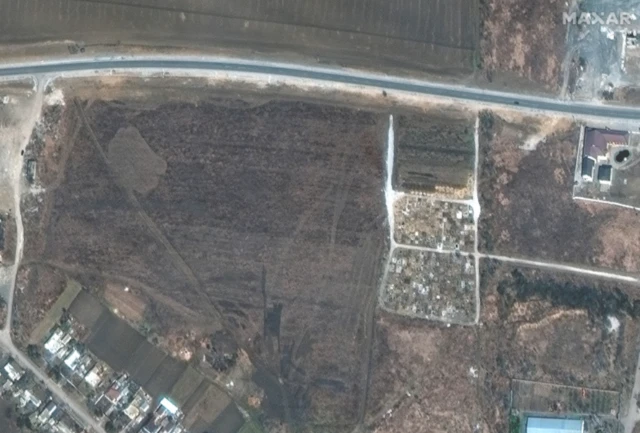 Image source, Maxar
Image source, MaxarA satellite image of Maxar purportedly showing a mass grave site near Mariupol
 Paul Adams
Paul Adams
Diplomatic Correspondent
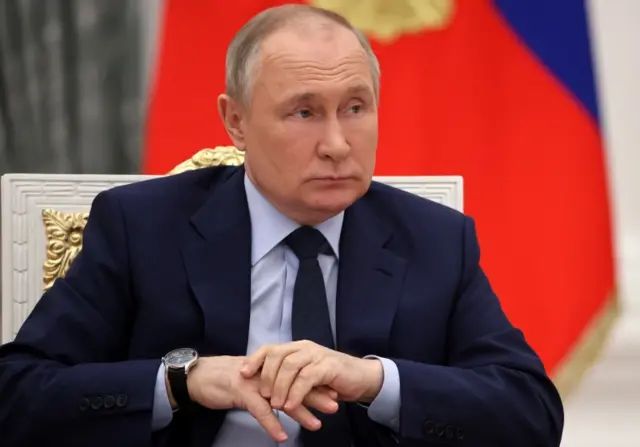 Image source, EPA
Image source, EPAWestern officials say they see some signs that Russia is addressing some of the problems that beset the early weeks of its invasion of Ukraine.
The fact that they are trying to advance along a more narrow set of lines means that issues like command and control are better.
But officials say the Russians are still operating in long convoys on single roads, which means they remain vulnerable to attack. Ukrainian troops, they say, “continue to fight in a very smart and very effective manner”.
Some of the Russian lines of communication are still quite long (notably south from Kharkiv) and exposed to attack from the west.
Officials say Vladimir Putin is “still in a position to win”, with a range of possible outcomes, none of which they expect to see happen quickly. The West is gearing up to sustain military support for Ukraine “through a prolonged period of conflict….perhaps much of the rest of this year".
A successful Russian campaign in the Donbas is possible and, in a worst case scenario, this could lead the Russians to revisit some of their pre-war objectives, such as Kyiv and Odesa.
Officials say that Russian forces enjoy a roughly three to one advantage in numbers over the Ukrainian military, but much depends on how smartly Moscow uses those forces and what capabilities the Ukrainian defenders have - hence the push by the West to send even more advanced equipment.
Russia still has large numbers of troops - between 5,000 and 10,000 - in the area around Mariupol, which means that there has been little or no movement on the southern side of Russia’s expected pincer movement against Ukrainian forces in the Donbas.
Officials say that if Putin wants to seal off Mariupol, this will not be a trivial task and will continue to limit the ability of those forces to take part in operations in the Donbas.
Officials note that Russia’s use of long-range Iskander missiles has slowed somewhat in the past week, suggesting Moscow has concerns about usage rates and the ability to restock.
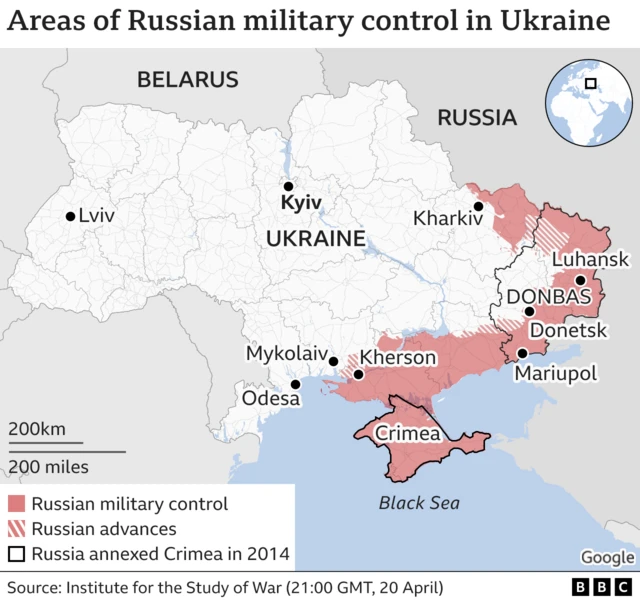 Image source, .
Image source, .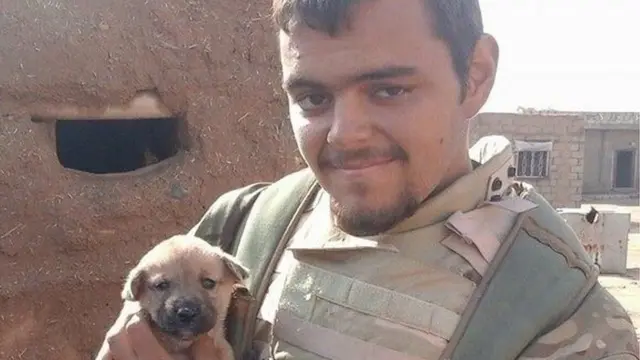 Image source, Facebook
Image source, FacebookAiden Aslin (pictured) and Shaun Pinner were both serving as marines in Ukraine's military
We've heard today from Russia's foreign ministry about the two British fighters reportedly captured by Russian forces while fighting in Ukraine.
"Don't worry, the Russian side is taking care of them," said ministry spokeswoman Maria Zakharova in a message on Telegram.
"They are fed, watered, and given the necessary assistance, just like other foreigners who have surrendered or been detained."
Shaun Pinner, 48, and Aiden Aslin, 28, were shown in two separate videos on Russian TV on Monday, asking to be exchanged with a pro-Russian politician held in Ukraine. It was not clear whether their requests were made under duress.
Both had been living in Ukraine before it was invaded, have Ukrainian partners and had been serving as marines in Ukraine's military. Russia says they were taken prisoner in the southern city of Mariupol.
Aslin's family said on Wednesday the video of him was "deeply distressing" and condemned "Russian propaganda".
In comments addressed to UK Prime Minister Boris Johnson, Zakharova said: "Don't pretend to be worried. You have absolutely no interest in the fate of the British in trouble. They did not have fun with you at parties in Downing Street."
Three school buses filled with people escaping from the besieged southern city of Mariupol have arrived in the city of Zaporizhzhia further west.
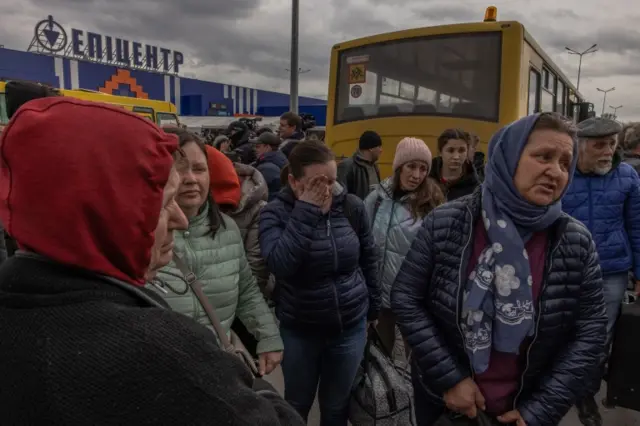 Image source, EPA
Image source, EPAOnly 79 people were able to travel on the convoy because of the difficulties in setting up humanitarian corridors, Ukrainian officials said
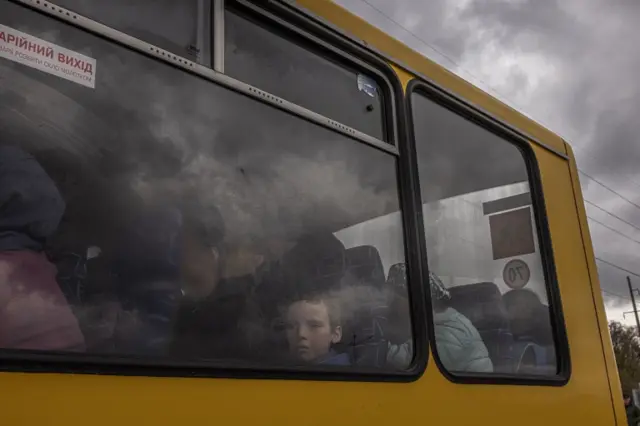 Image source, EPA
Image source, EPAPeople crossed through territory held by Russian forces to get to safety
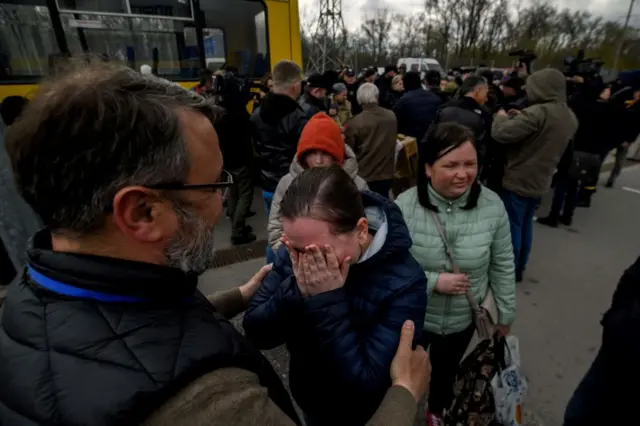 Image source, AFP
Image source, AFPThere were emotional scenes as people met relatives and friends at a registration centre for internally displaced people in Zaporizhzhia
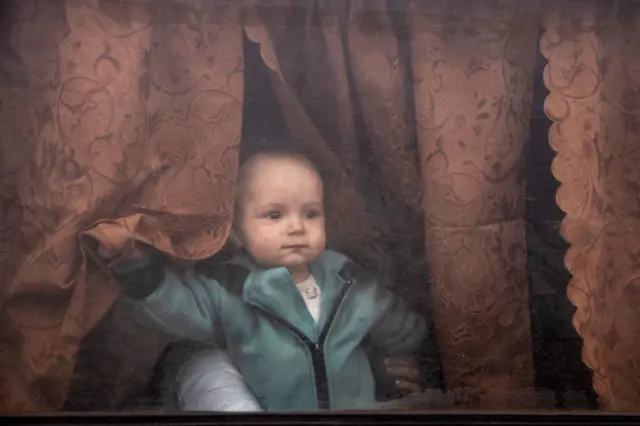 Image source, Getty Images
Image source, Getty ImagesThe convoy was carrying people from Mariupol, Melitopol and surrounding towns under Russian control
If you're just joining our live coverage, here are the latest developments on the war in Ukraine:
Of the 71,800 Ukrainian refugees who have been granted visas, only 21,600 have actually arrived in the UK, government figures show.
This may be because some are still waiting for their family members’ applications to be approved, or they have decided to stay somewhere closer to Ukraine.
The visas were issued under the Ukraine Family Scheme - which Ukrainians with a family member in the UK can apply for - and the Homes for Ukraine Sponsorship Scheme - which allows people already living in the UK to host Ukrainian refugees known to them.
The Homes for Ukraine scheme has been widely criticised because of delays, with Home Secretary Priti Patel apologising for the “frustrating” lags in the scheme.
Processing delays mean some Ukrainian refugees wait almost three weeks for their visas to be approved.
In an email to those registered in the scheme, the government acknowledged the “unacceptable” delays and explained they were now "working to accelerate the award of visas under Homes for Ukraine".